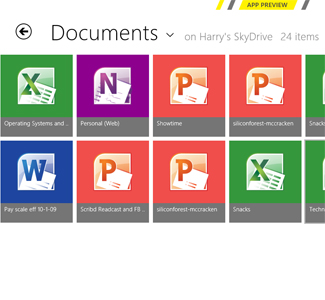As before, the Desktop works with a touchscreen–but it doesn’t work very well. I often had to jab at icons and menus repeatedly before my input registered, and the onscreen keyboard is no substitute for physical QWERTY in productivity apps such as Word and Excel. The more time you spend trying to use standard Windows apps with your fingers, the more obvious it is why Microsoft decided that it couldn’t prep Windows for the iPad era solely with nips and tucks.

Harry McCracken / TIME.com
The most notable change to the Desktop in the Consumer Preview is a subtraction, not an addition: Microsoft has eliminated Windows’ single most iconic feature, its Start Button. Without it, the Taskbar looks oddly incomplete. But if you hover your mouse pointer where it used to be, you get a thumbnail image that takes you to the Metro-ized Start Screen, which is meant to replace the Start Button in the hearts and minds of Windows users everywhere.
At first blush, the forced retirement of the comfy old Start Button and mandatory use of the Smart Screen feel like pigheaded moves on Microsoft’s part. They might also be self-defeating. Millions of PC users still cling to Windows XP and see no reason to adopt a new operating system, period; they might be more inclined to give Windows 8 a chance if wasn’t quite so aggressively unfamiliar.
Then again, if Microsoft is serious about Metro it makes sense to put it front and center. Hopscotching between new Metro programs and old Desktop ones–which is what most Windows 8 users will do at first–is going to be an inherently disjointed, unsatisfying stopgap. Windows 8 will only be a landmark operating system if consumers embrace Metro. And they’ll only do that if developers write outstanding Metro programs, and if PC manufacturers create machines that are truly designed with Metro in mind.
That’s a lot of ifs. Most of them will be tackled by other hardware and software makers, not Microsoft. And even once Windows 8 has been released, it will take years, not months, before it’s clear how well they’ve addressed them.
Which is okay. Microsoft is intent on getting this operating system out the door in time for this year’s holiday PCs, but Windows 8 isn’t primarily about moving boxes in 2012. What it’s trying to build is a foundation for a Windows that stands a chance of being relevant a decade or two from now. The Consumer Preview is just a baby step in the right direction–and it’s going to be fascinating to see if Windows users are as open to dramatic change as Microsoft is showing itself to be.
More Windows 8 Coverage:
- 50 Windows 8 Screenshots, Hardware Photos and More
- In Pictures: The First Windows 8 Tablet
- Windows 8: What You Need to Know
- Windows 8 Nitpicks and Worries
- Why It’s Important that Microsoft Succeeds with Windows 8
- Do Windows 8 Tablets Stand a Chance?
- Looking Forward to 2012: Credible iPad Threats
- The Windows Start Button Is Dead! Long Live the Windows Start Button!
- Is Windows for ARM a Dead End?
- Mountain Lion vs. Windows 8: Oh, So Very Different


